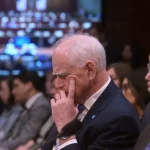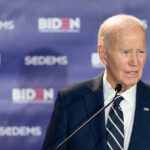Candidates and pundits were not overstating things when they characterized the 2024 election as the most important in decades or perhaps even in the nation’s entire history. Every election is consequential, yet this one does seem to have been more potentially transformational than most. The contrast between the nation’s two political parties looks much more like a clash of civilizations than a battle over public-policy issues.
The election campaign showed that two very different kinds of people are living in this country and have completely opposing designs for the central government. The left indicates that nothing less than their full dominance of all the nation’s institutions of power is acceptable. The right argues that the central government has taken up too much power and that we must reduce its load before it malfunctions and self-destructs.
The Harris-Walz campaign and mainstream media spared nothing in their attacks on Trump and Vance, in particular tarring Trump as a would-be dictator and claiming the “Make America Great Again” agenda is a cover for Nazism. President Joe Biden referred to Trump supporters as “garbage,” a term of derision perfectly in alignment with his party’s rhetoric of the past dozen years.
Democrats have continuously characterized Republican voters as bitter clingers and racists who are deplorable, irredeemable, weird, and dangerous semi-fascists, extremists, insurrectionists, domestic terrorists, fascists, Nazis, and followers of a petty tyrant.
Donald Trump deployed harsh language, as well, calling Harris, Biden, and their advisors and political appointees Marxists, communists, fascists, very dangerous people, an enemy from within, “the ones who are destroying the country,” and other such terms. It is worth noting, however, that Trump is bipartisan in his attacks, regularly criticizing Republicans who cross him, and that Trump generally aims his barbs at criminals and people in power: those in government, the media, private nonprofit organizations, and big businesses allied with Democrats.
The rhetoric in the presidential campaign thus indicated that Trump strongly disapproves of the people currently in power in the United States, while Democratic politicians have intense feelings of distrust and disdain toward a large percentage of the American people and, in fact, a majority of those who voted in this year’s elections.
Those are diametrically opposed targets of criticism, and they reflect the two parties’ increasingly diverging points of view: populism for Republicans, and elitism for Democrats.
Many people blame social media for the corruption of political language, and, of course, Democrats and the national press (the latter being a subset of the former) claim that Trump is the one who started the rhetorical decline. That is not true. President Obama preceded Trump in this behavior, and Hillary Clinton was casting aspersions against her political opponent at least as profligately as Trump throughout the 2016 campaign.
Technology and changing mores in American society have certainly contributed to the corruption of campaign rhetoric, but the real cause of the hostility in the nation’s political culture and the heightened accusations of malice is the excessive concentration of power in Washington, D.C.
Should Trump drastically reduce the size of the federal government?
Yes: 0% (0 Votes)
No: 0% (0 Votes)
If this was the most important election in the nation’s history, it is because we were voting on who will control the biggest, most powerful, most expensive, most politicized, most weaponized, most intrusive, most partisan, most profligate, most reckless, and least accountable federal government ever.
As a quick indicator of the size and irresponsibility of the U.S. government, note that the national debt has risen by 38 percent since 2019 and is now at 122 percent of GDP. Federal government liabilities (funded plus unfunded) per citizen are now $651,951, while total household and business assets are just $642,061 per citizen.
These claims on the fruits of the American people’s hard work, savings, and investments are irresponsible and unconscionable. It is understandable that those being subjected to this confiscation are appalled and that those who receive benefits from that system are fiercely protective of it.
There is too much at stake in our elections. Congress and the White House have allocated more than our entire current store of private assets toward future spending.
It is no mystery why those who aspire to spend all that money and thereby enjoy the power of the world’s biggest purse would come to resent and even despise anyone who might frustrate that desire, such as Trump. These enlightened individuals are certain that they are less selfish about the spending of all this wealth than the unexceptional drones who worked to create it and the greedy capitalists who invested their personal assets in building it all.
Government experts know far better how to “invest” the people’s wealth, and they always do so far more impersonally and without favoritism, or so leftists claim.
The 2024 vote may indeed have been the most consequential ever. What was on the line was whether that enormous, invasive, and disastrously inefficient government would be expanded further, or some efforts would be made to pare it back and reduce its use of businesses and nonprofits to do its bidding.
Democrats openly advocated nearly unlimited centralization of power, and Republicans were clearer than ever before about reversing that process, thanks largely to Trump’s determination and force of character.
The only way to reduce the intensity of this dispute is to shrink the stakes involved. To clean up the nation’s political rhetoric, we must reduce the power of our government — dramatically and uncompromisingly. Until then, our deteriorating political rhetoric will serve as an accurate indication of how thoroughly our government is destroying our wealth and our very viability as a nation.
Trump made that the central issue of his campaign. Success for him as president will both ease political tensions and rescue the nation from politically imposed self-destruction.
The views expressed in this opinion article are those of their author and are not necessarily either shared or endorsed by the owners of this website. If you are interested in contributing an Op-Ed to The Western Journal, you can learn about our submission guidelines and process here.
Advertise with The Western Journal and reach millions of highly engaged readers, while supporting our work. Advertise Today.






